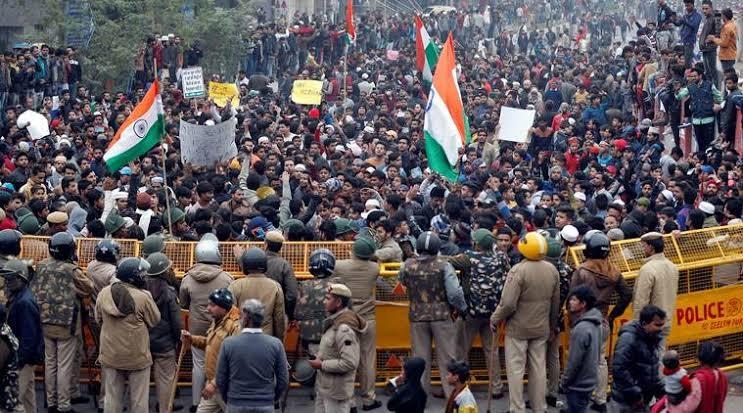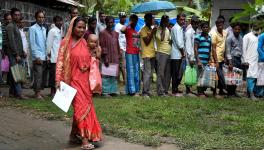Has Communal Polarisation Reached its Peak?

Image Courtesy: The Indian Express
The Bharatiya Janata Party-Rashtriya Swayamsevak Sangh communal juggernaut seems to have hit a temporary roadblock. They have perfected the method of communal polarisation, which serves them well in electoral politics. Polarisation worked very well for them in Gujarat, and to an extent, nationally. They thought they would play the same card, getting the same advantages, in the North-east and Jammu and Kashmir as well. For a while, it appeared to be working. Even those who question the politics of communalisation were silenced. The BJP won the Assembly election in Assam and formed a coalition government in most other states in the North-east as well as enough seats in Hindu-dominated Jammu, and, quite unexpectedly tied up with Kashmir-based Peoples Democratic Party to form government there too. But when BJP tried to extend its communal politics too far, it has backfired.
Multi-ethnic North-east, where no single community has a very large share in the population, has always feared the influx of outsiders and their dominance. The main concern of indigenous people is to protect their interests, especially their cultural identity. At first when it started the National Register of Citizens exercise in Assam, the BJP rode this anti-outsider sentiment, but when it realised that a large number of Hindus were excluded from the NRC, contrary to its expectations, it played the communal card with the amended citizenship law of 1955.
However, the BJP still failed to comprehend that Assam, the North-east in general and even Jammu and Kashmir are not fertile grounds for communalisation of politics. In these regions, it is not the religious but other local identities, such as Kashmiriyat, which are more dominant.
The protests against the amended Citizenship Act, which started from the North-east, have now spread to other parts of India. The Home Minister Amit Shah’s insistence that an all-India NRC (NRIC) will be conducted next has stoked fears among all the landless and the poor, who fear they will not be able to prove that their previous generations lived in this country.
The Citizenship Amendment Act is a sword hanging on the head of Muslims. If they are unable to prove their citizenship, then they may be declared illegal immigrants and sent to detention camps like criminals. This fear has pervaded among not only the Muslims who may have migrated into India in the past few decades, but also many of those who are Indians and have been living here for generations, just like Indians of any other religion.
The act of excluding Muslim immigrants from three countries from staking a claim to citizenship is a purely communal tool which will destroy the right to equality before the law enshrined in our Constitution. This right is not restricted to citizens of the country alone, but to all residents of India. This may be the beginning of the process where this country will see informal graded citizenship over a period of time, as has happened in Pakistan.
In India’s northwestern neighbour, the state considers a Punjabi from Lahore its most loyal citizen, a slightly diminished loyalty is designated to Punjabis from outside Lahore. Non-Punjabis are relegated to one rung further down the hierarchy of citizenship conceptualised in Pakistan. And, the loyalty of anybody from outside Punjab and Sind is always held in suspicion. If RSS-BJP is allowed to govern the political agenda of this country for some more time, it may be that Brahmins from Nagpur will be considered the country’s most eminent citizens, followed by Brahmins from Maharashtra in general, and so on. In this conceptualisation of citizenship, non-Brahmins will have a slightly lower status than the Brahmins but tower above the dalits, tribals, women. Everybody who happens to be outside the Hindu fold, especially the Muslims, will be perpetual suspects in the eyes of the state. The courts will silently endorse this hierarchy, as they seem to have no problem in going along with the Hindutva agenda.
The damage this will do to the spirit of the Constitution and the social fabric of the country is unimaginable. All the progress made towards a society which respects equality, liberty, justice and fraternity will be reversed. The only way to prevent the advance of Hindutva agenda is to disempower the flag-bearers of this politics.
Swami Vivekananda, in his famous speech at the Parliament of World Religions in Chicago, had identified an important characteristic of Hinduism as having assimilated any group of people coming from outside. Rohingyas were the first group this Hindutva government opposed and now, with the CAA, it seeks to institutionalise such communal thinking.
Shah claims that through the NRC and CAA he will expel every intruder from this country. Actually, it is the RSS-BJP who are intruders. Without having participated in the freedom struggle (the lone Hindutva activist who went to jail, VD Savarkar, apologised to the British to secure his freedom, and even accepted a pension from them) or made any sacrifices for nation-building, without harbouring any faith in the values embedded in the Constitution or in democracy, they have captured the system of governance, fully backed by money power.
A majority of Indians do not subscribe to the BJP-RSS ideology, but this government takes decisions as if it has no accountability to the future generations of the country. The destructive project of Hindutva will be buried only when people expel its leaders from Assemblies and the Parliament.
Akhil Gogoi, one of the most popular Assamese mass leaders and an advisor to the Krishak Mukti Sangram Samiti, has been incarcerated under Unlawful Activities Prevention Act, 2019, charged with using Citizenship Act to promote social enmity. Under the present circumstances, the same charge will hold true against the government itself, for it has become a threat to the country.
Sandeep Pandey is with the Socialist Party (India) and Rahul Pandey is an academic, entrepreneur and activist.
Get the latest reports & analysis with people's perspective on Protests, movements & deep analytical videos, discussions of the current affairs in your Telegram app. Subscribe to NewsClick's Telegram channel & get Real-Time updates on stories, as they get published on our website.
























